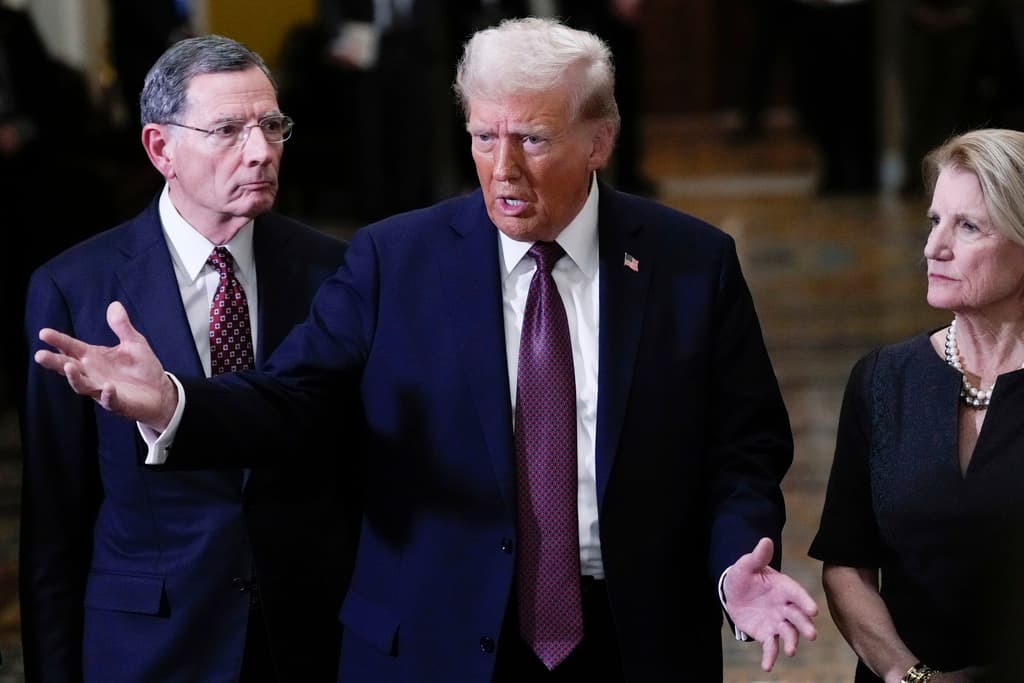With Hostage Deal, the ‘World Is Seeing Donald Trump Coming Into Power,’ Senator Barrasso Tells the Sun
A complex pact is reached for the eventual return of all 98 captives, Israelis and Americans, living and dead.

Will a complex deal, reached at Doha on Thursday, to release Israeli hostages and effectively end the Gaza war intensify tectonic geopolitical shifts in the Mideast that were the direct result of Israel’s recent military successes?
Three Israeli women held in Gaza for more than 15 months are expected to be released Sunday, and at least 30 more are to be freed in stages in coming weeks. If all of the deal’s three phases are implemented, every one of the 98 hostages currently in Gaza — dead or alive — will be released, and the Gaza war that was launched with Hamas’s October 7, 2023, horrors will essentially end.
Three living American hostages and four bodies of other Americans are not expected to be included in the initial release batch, and the deal’s complexities could make implementation difficult. Some in Israel also fear that it would leave Hamas in power.
“We want to make sure every one of those hostages gets out, certainly the American hostages,” the Senate’s no. 2 Republican, John Barrasso, tells the Sun. “I think that the world is seeing Donald Trump coming into power in the United States, and we’re seeing changes around the world to reflect a new strength in America.”
President-elect Trump was the first to officially bless the Doha agreement. “We have a deal for the hostages in the Middle East,” he wrote Thursday. “They will be released shortly. Thank you.” The president-elect’s consistent threats of “hell” to be paid if the hostages weren’t released appear to have been instrumental in finalizing the deal, which he is hoping to expand further.
“With this deal in place,” the president-elect wrote, “my national security team, through the efforts of special envoy to the Middle East, Steve Witkoff, will continue to work closely with Israel and our allies to make sure Gaza NEVER again becomes a terrorist haven.” The deal, he added, could “further expand the Abraham Accords,” likely a hint that Saudi Arabia could soon agree to sign a peace treaty with Israel.
President Biden also touted “new opportunities” in the Mideast. He stressed that it was a formula he and the Israeli prime minister worked out last spring that served as a basis for the deal, and insisted that his administration handed over to his successor opportunities for major regional shifts. “I hope they’ll take” those opportunities, he said.
Prime Minister Netanyahu has long sought a Saudi pact to complete his vow to change the region’s geopolitics. The Israel Defense Force’s weakening of Hamas, Hezbollah, and Iran have already prompted some tectonic regional shifts, including the end of the Assad regime in Syria and the election of a new Lebanese president.
Mr. Netanayahu’s cabinet is widely expected to ratify the Doha deal, even as the premier noted Wednesday that minor details are yet to be finalized. Two right-wing cabinet ministers, Itamar Ben Gvir and Betzalel Smotrich, are on record opposing the deal, but in Israel they are seen as unlikely to leave the government or trigger new elections.
Past experience, as well as last-minute holdups at Doha as late as Wednesday morning, indicate that stumbling blocks may yet cause reversals in implementation. Officially announcing the deal’s completion, the prime minister of Qatar, Mohammed al-Thani, said he hoped that “all sides will stick to the agreement’s provisions.”
Yet, while the Qatari premier was hoping to be first to announce that Hamas and Israel have agreed to the deal, he was forced to delay the scheduled press conference for hours while Hamas reportedly declined to officially offer its blessing.
When more than 100 hostages were freed in phases in November 2023, Hamas delayed releases, gathered throngs of protesters to vilify the abductees as they were bused home, and announced new stumbling blocks for each step. Yet, the pact was ultimately completed as agreed.
Now, too, “we are expecting nerve-wracking days,” a Kan News reporter, Suleiman Masawde, said. After the expected Sunday release of three women, four more hostages are expected to be freed a week later. Thirty-three women, children, and men are expected to be included in the first stage, Yet, their identities beyond the first seven, and how many of them are alive, are yet to be clarified by Hamas.
According to the deal, three hostages are to be released each week in the first phase’s 42 days while the IDF redeploys its troops, leaving most Gaza posts and establishing a half-mile-wide perimeter inside the Strip around the Israeli border.
Negotiations over details of the second and third phases are expected to be launched on day 16 of the first stage. Mr. Netanyahu, reportedly, is attempting to shorten the process by combining the second and third stages, at the end of which hostilities will end and all hostages released.

